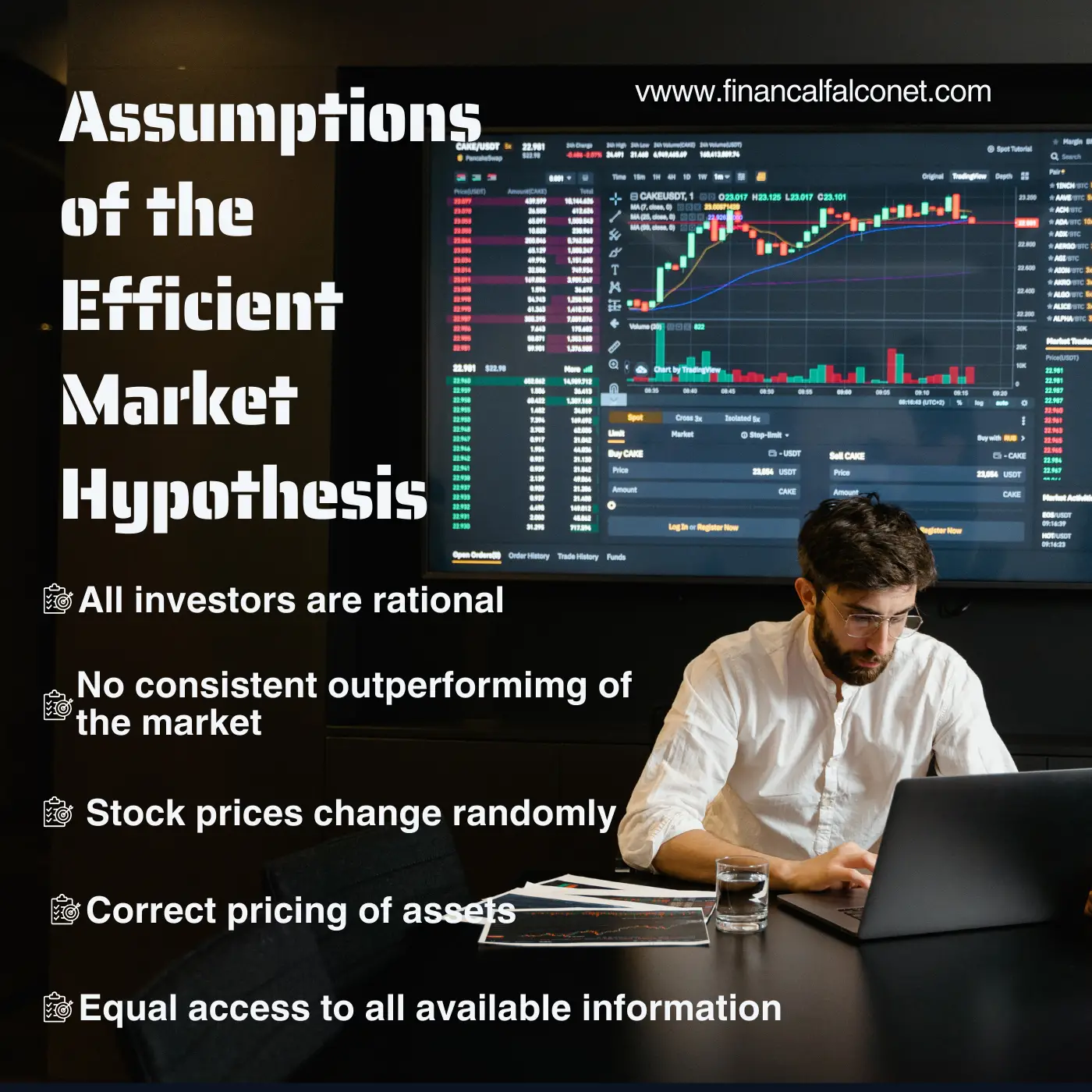The assumptions of the efficient market hypothesis are the building blocks and preconditions that ensure the effectiveness of the EMH.
All the assumptions of the efficient market hypothesis are captured in its assumption of the existence of an efficient market where the prices of stocks fully reflect all available information, investors are rational, and information is readily available.
We shall discuss these and other additional assumptions of the efficient market hypothesis after we explain the EMH.
Read about: What is Financial Leverage? Types and Example
This implies that the market price of any traded asset is always correct, meaning that there would not be undervalued or overvalued assets on the financial market.
Thus, no investor can sell assets above the fair market value or purchase assets below their fair market value, therefore, no investor can consistently outperform the market in the long term by skillfully picking assets.
Instead, if an investor wants to outperform the market, it can only be done in the short term by purchasing assets that have greater risks and returns.
Several economists and mathematicians such as Louis Bachelier, Jules Regnault, Leonard Savage, and F.A. Hayek have been associated with the hypothesis but it is Eugene Fama’s work in the 1960s that brought the needed attention to the efficient market hypothesis.
He additionally explained the 3 known types of the efficient market hypothesis. The efficient market hypothesis is also referred to as the efficient market theory and often abbreviated as EMH.

Read about: Financial leverage ratios and formula
What does the efficient market hypothesis assume or state?
The efficient market hypothesis assumes that all investors have equal and free access to all available information about future developments such as inflation, stock splits, interest rates, share buybacks, and all other economic factors that may affect their investment. It also assumes an informationally efficient market where the prices of assets wholly reflect all available information.
This implies that as soon as new information is made available, market prices adjust swiftly to reflect it, thereby ensuring that the market value of assets at any given time is accurate.
The assumptions of an efficient market therefore indicate that it is impossible for an investor to consistently earn above average returns on their investments.
Read about: Equity Options: Examples and Types
Assumptions of efficient market hypothesis
- All investors are rational
- Correct pricing of assets
- Equal access to all available information
- Stock prices change randomly
- No consistent outperforming of the market
All investors are rational
One of the assumptions of the efficient market hypothesis is that all investors are rational. This implies that investors do not act on emotions such as fear and greed, hence they will not sell off their traded assets for less than their fair market value (FMV) nor buy for more than the FMV.
Additionally, rationality implies that they are averse to risks. This means that if a rational investor is presented with two investments irrespective of the promised return, the investor will choose the investment with lesser risks.
Due to this investor’s rationality, they will invest in safe assets with low risk, hence, they will all earn within the average market return rate range.
Correct pricing of assets
The efficient market hypothesis additionally assumes that all traded assets such as stocks and bonds are correctly priced, this implies that traded assets are never overvalued or undervalued.
The correct valuing and accurate pricing of traded assets is made with the assumption that all valuable information about the traded assets is made public in a timely and efficient manner such that all new information gets fully and instantly reflected in the market price of the asset.
Hence, the efficient market hypothesis posits that it is impossible to have undervalued or overvalued stocks trading on the financial market.
Equal access to all available information
In an efficient market, everyone has equal access to all available information such as historical data on stock prices and market trends.
They also have access to all current public information such as the filing of annual earnings and dividend declaration as well as private information that has not been made public such as planned mergers, acquisitions, or stock splits.
This indicates that no arbitrage opportunity is available because no investor has the advantage of having access to information that is unavailable to other investors.
Additionally, the accurate pricing of assets due to the instant adjustment of the market to new information ensures that even when an investor does have access to privileged information, the price of assets would have adjusted before they could act on the new information. Therefore, no investor can earn above other investors in the market consistently.
In addition, the efficient market hypothesis also assumes that all investors evaluate the available information in the same way; this implies that when presented with the same set of information, all investors will come to the same conclusion.
For instance, if investor A concludes that the shares of a company such as Berkshire Hathaway are supposed to trade at $10, investor B will also come to the same conclusion when presented with the same information that is available to investor A.
Thus, equal access to all available information is another assumption of the efficient market hypothesis that ensures no investor beats the market consistently because employing investment analysis strategies is ineffective.
Stock prices change randomly
The efficient market hypothesis assumes that stock prices change randomly without following any set patterns or trends. This means that even if investors were to study past stock price trends, they would not be able to forecast future price trends accurately.
This random change in price indicates that employing analysis such as technical, fundamental, or any other kind of analysis is not useful in gaining any form of advantage in the financial market.
No consistent outperforming of the market
An additional assumption of the efficient market hypothesis is that no investor can consistently outperform the market in the long run. This is based on earlier assumptions that the market is efficient hence due to the rational behaviour of investors, accurate pricing of assets, and random changes in stock price.
Furthermore, the assumed informational efficiency whereby all investors are privy to the same information further eliminates any possibility of gaining above-average returns consistently for a long time.
Read about: What are Unlisted Shares? Pros and Cons
What are the 3 forms of efficient market hypothesis?
The three forms of the efficient market hypothesis are the weak, semi-strong, and strong efficient market hypothesis.
The weak form of the efficient market hypothesis postulates that past information is not useful in forecasting future price changes, hence technical analysis of past information is useless.
The semi-strong efficient market theory postulates that the market adjusts almost instantly to new information, hence the use of fundamental analysis does not confer any benefits.
The strong efficient market hypothesis assumes an efficient market, with all information readily available to all investors, prices randomly changing based on the information, and investors earning within the average market return rates. Thus, no form of investment analysis could provide any form of leverage to its user.
Each of these efficient market hypothesis forms reinforces the theory’s overall conclusion on the efficient pricing of assets, informational efficiency, and efficient financial market.
Read about: What are Diluted Shares? Formulas and Examples
Conclusion
The assumptions of the efficient market hypothesis include rational behavior of investors, accurate asset pricing, information efficiency, and random changes in stock price based on available or new information. Additional assumptions are that there are no transaction costs, taxes, or regulations.
These assumptions are predicated on the premise that the market quickly adjusts to new information, thereby making it self-regulatory. It also indicates that outperforming the efficient market consistently is impossible.
These efficient market assumptions have been criticized by some economists who argue that psychological and behavioral factors also play a role in the financial market and that it is possible to predict stock returns. One example that is often cited is Warren Buffet who has been able to gain above average returns on his investments in decades.
They further reference previous financial crises such as the global financial market crash of 2007/2008 as indicators that these assumptions did not account for the possibility and risks posed by overvalued assets and excessive debt.
Blessing's experience lies in business, finance, literature, and marketing. She enjoys writing or editing in these fields, reflecting her experiences and expertise in all the content that she writes.
